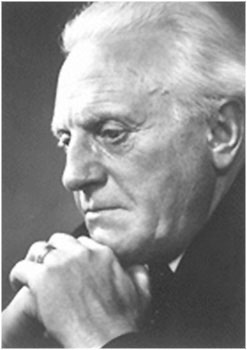- Pär Lagerkvist
Infobox Writer
name = Pär Fabian Lagerkvist

birthdate = birth date|1891|5|23|mf=y
birthplace =Växjö ,Sweden
deathdate = death date and age|1974|7|11|1891|5|23|mf=y
deathplace =Stockholm ,Sweden
occupation = poet, playwright, novelist, essayist, short story writer
nationality = Swedish
awards = awd|Nobel Prize in Literature |1951Pär Fabian Lagerkvist (
May 23 ,1891 —July 11 ,1974 ) was a Swedish author who was awarded theNobel Prize in Literature in 1951.Lagerkvist wrote poems, plays,
novel s, stories, andessay s of considerable expressive power and influence from his early 20s to his late 70s. Among his central themes was the fundamental question of good and evil, which he examined through such figures as the man who was freed instead of Jesus,Barabbas , and thewandering Jew Ahasuerus. As a moralist, he used religious motifs and figures from the Christian tradition without following the doctrines of the church.Biography and works
Lagerkvist was born in
Växjö (Småland ).Lagerkvist received a traditional religious education which strongly influenced all his works, although his passion for religion mellowed in his later years under the influence of modern scientific ideas, which eventually led him to break with the religion of his forefathers.
In his early years Lagerkvist supported modernist and radicalist views, as shown by his manifesto "Ordkonst och bildkonst" (word art and picture art) (1913) and the plays "Den Svåre Stunden" ("The Difficult Hour"). He was also influenced by socialism.
One of the author's earliest works is "Ångest" ("Anguish", 1916), a violent and disillusioned collection of poems. His anguish was derived from his fear of death, the World War, and personal crisis. He tried to explore how a person can find a meaningful life in a world where a war can kill millions for very little reason. "Anguish, anguish is my heritage / the wound of my throat / the cry of my heart in the world." ("Anguish", 1916.) "Love is nothing. Anguish is everything / the anguish of living." ("Love is nothing", 1916.) This pessimism, however, slowly faded, as testified by his subsequent works, "Det eviga leendet" ("The Eternal Smile", 1920), the autobiographical novel "Gäst hos verkligheten" ("Guest of Reality", 1925) and the prose monologue "Det besegrade livet" ("The triumph of Life", 1927), in which the faith in man is predominant.
Ten years later "Hjärtats sånger" ("Songs of the Heart") (1926) appeared. This collection of poems is slightly less desperate in its tone and expresses the strive to come to peace with life itself that was to become so prominent in his later works. In "Hjärtats sånger" he wrote: "Only you, my bosom, is left, / you who can suffer, / you who can feel the depth of pain / but not complain." His prose
novella "Bödeln", later adapted for the stage, ("The Hangman", 1933; play, 1934) shows his growing concern with thetotalitarianism and brutality that began to sweep acrossEurope in the years prior toWorld War II . Criticism against Fascism is also present in the play "Mannen utan själ" ("The Man Without a Soul", 1936).Lagerkvist's 1944 novel "Dvärgen" ("
The Dwarf "), a cautionary tale about evil, was the first to bring him international attention. This was followed in 1949 by the unusual play "Låt människan leva" ("Let Man Live")."Barabbas (1950)", which was immediately hailed as a masterwork (by among others fellow Nobel laureate
André Gide ) is probably Lagerkvist's most famous work. The novel is based on a minorBiblical story.Jesus ofNazareth was sentenced to die by the Roman authorities immediately before the JewishPassover , when it was customary for the Romans to release someone convicted of a capital offense. When the Roman procuratorPontius Pilate offers to free Jesus or Barabbas, a convicted thief and murderer, a Jerusalem mob demands the release of Barabbas, who spends the rest of his life trying to come to terms with why he was chosen to live.The novel was filmed in 1962, with
Anthony Quinn playing the title role.Lagerkvist died in
Stockholm .Works
* "Ordkonst och bildkonst" (1913)
* "Motiv" (1914)
* "Järn och människor" (1915)
* "Ångest" (1916)
* "Teater" (1918)
* "Kaos" (1919)
* "Det eviga leendet" (1920)
* "Den lyckliges väg" (1921)
* "Onda sagor" (1924)
* "Gäst hos verkligheten" (1925)
* "Hjärtats sånger" (1926)
* "Han som fick leva om sitt liv" (1928)
* "Bödeln" (1933)
* "Den knutna näven" (1934)
* "Seger i mörker" (1939)
* "Sång och strid" (1940)
* "Dvärgen" (1944)
* "Barabbas" (1950)
* "Aftonland" (1953)
* "Sibyllan" (1956)
* "Det heliga landet" (1964)
* "Mariamne" (1967)References
*Fulvio Ferrari, introduction to Italian edition of "Gäst hos verkligheten" and "Det eviga leendet", Oscar Narrativa #1242, Mondadori, Milan, June 1992
Wikimedia Foundation. 2010.
